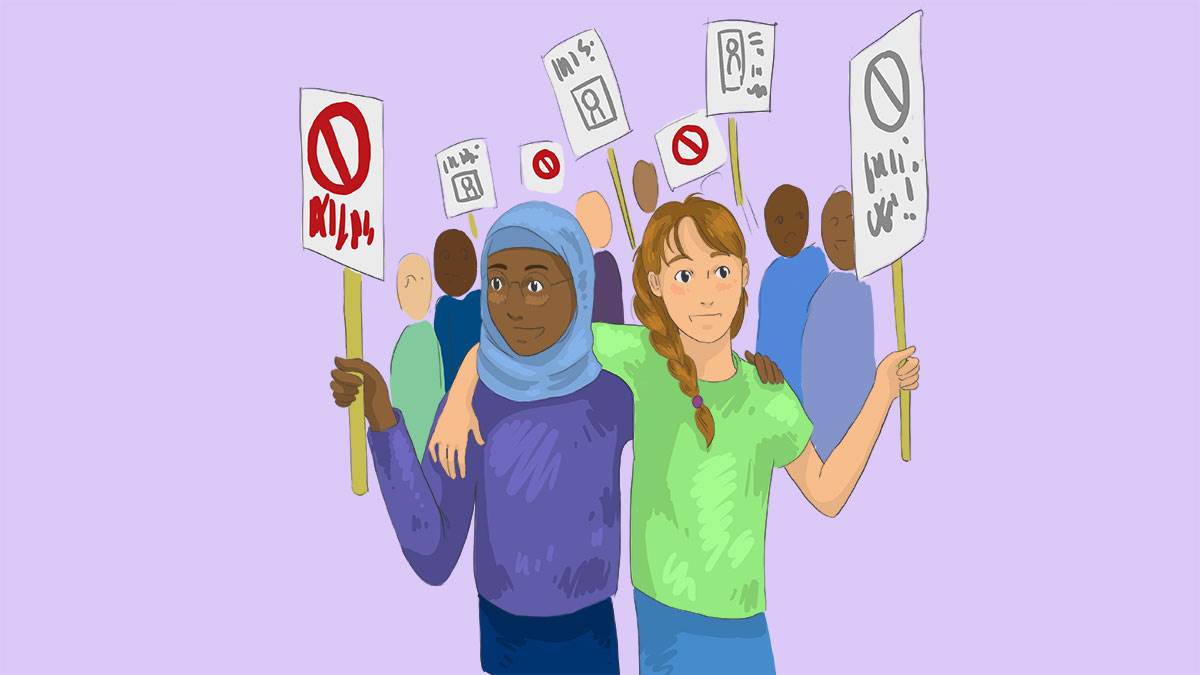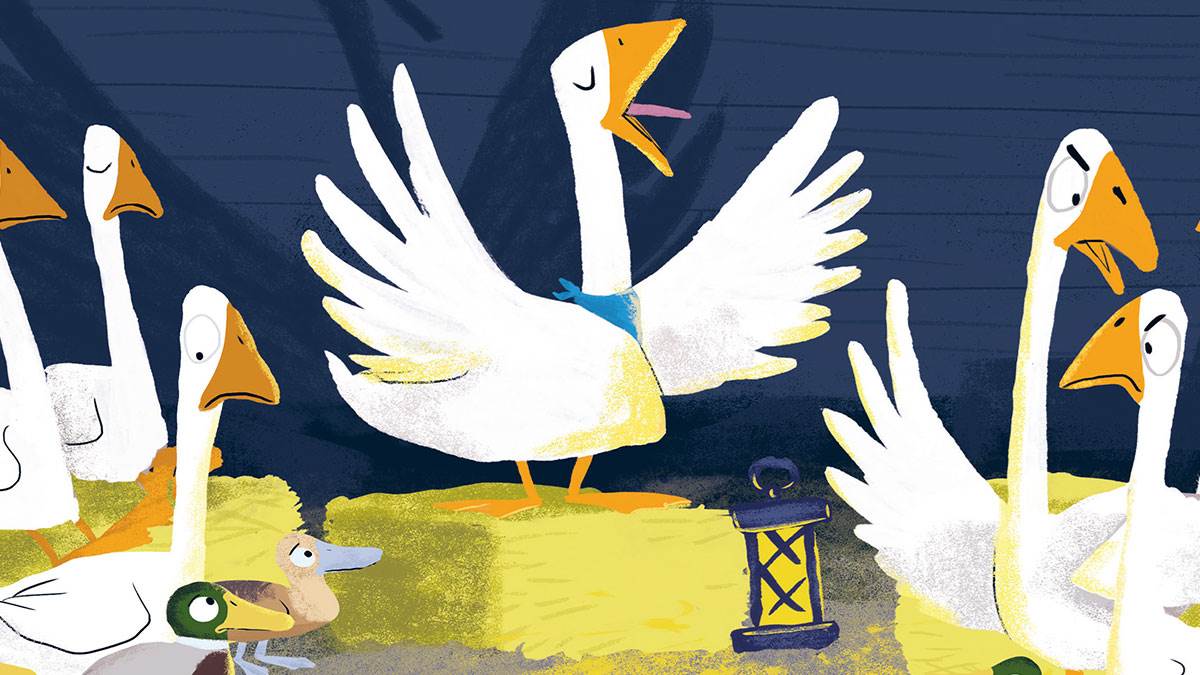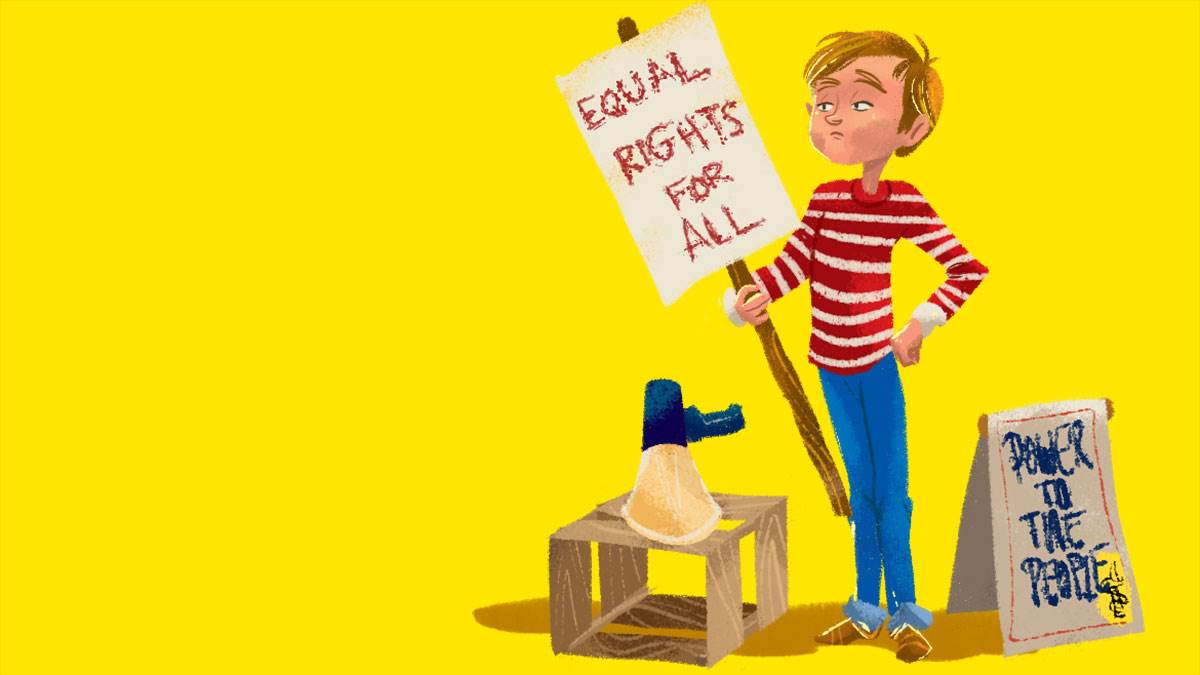Brexit and The Little Island: Why we should talk to little people about big issues
Published on: 23 October 2019 Author: Smriti Prasadam-Halls
The issues of today will affect children tomorrow, says author Smriti Prasadam-Halls – so here's how stories can get you talking about big, weighty topics in a way that feels hopeful and safe.
 Illustration by Emily Rowland
Illustration by Emily Rowland
When he was seven years old, my eldest son came home from school and proudly announced that he had learnt ‘the B-word’. He glanced with glee at our horrified faces and then proceeded to produce a word which hilariously and bafflingly was neither a swear word, nor began with B.
Several years have passed and a new ‘B-word’ has been introduced into the English language. This one really DOES begin with B and is known to ALL the 7-year-olds in the land. Similarly, it is not actually a swear word, yet you might mistakenly assume it was, given the strength of feeling, anxiety and rage it can provoke in all manner of adults on all sides of the political spectrum.
That word, of course, is Brexit, and it provided the inspiration for my picture book The Little Island.
The big issue
I wanted to write a story that spoke peacefully and powerfully to children about these turbulent times. It was my way of responding to the national and international political situation of recent years. My way, as a writer, of trying to create something meaningful and hopeful out of the chaos around me.
I wanted to tackle one of the biggest issues of our time and translate that complexity into the simplest of stories that even the smallest child could understand.
The Little Island is a farmyard fable of ducks and geese; a book for readers of ALL ages. It can be understood quite simply as a story of feathery friendship, or more deeply in connection with the wider political and social situation. It is a story filled with humour and warmth and a cast of characters we can feel affection and empathy for, whichever side of the bridge they stand. A story that I hope is enjoyable and exciting, scary and satisfying. A story that gives answers… but also, most importantly, raises questions.
The title, 'The Little Island'
The “Island” in the title refers to the saying, taken from the poet John Donne, 'No man is an Island'.
 From the front cover of The Little Island by Smriti Prasadam-Halls, illustrated by Robert Starling
From the front cover of The Little Island by Smriti Prasadam-Halls, illustrated by Robert Starling
It expresses the idea that people work best in community with others, not alone. The word 'little' refers to how "small" we can sometimes be when we aren't respectful towards others or are unwilling to share the plenty that we have.
It's also a reminder that although we may believe ourselves to be big and mighty, to others we may appear small and vulnerable… And danger may be lurking just around the corner.
Building bridges
In these days of deep division, it has been troubling to hear aggressive slogans like 'go home' and 'build a wall', 'take back control' and 'breaking point'. Words that feel destructive and cruel; words that expose fear and anger. Language has such power and when words are used as weapons, they can cause damage.
The Little Island shows the need to build bridges by raising our voices for GOOD. It’s a story of solidarity, tolerance and friendship, and shows just how much we rely on and gain from each other. A story where broken down relationships can be mended. Where bridges can be built and rebuilt.
I have wrapped this book up in HOPE: hope for the future on our OWN little island where, just like the animals in the story, WE will need to be able to build bridges.
'There was once a farm where all the animals were friends. Together, they looked after the farm and each other. It wasn’t perfect and they didn’t always agree (animals almost never do). But they liked it.'
Relationships are tricky, rarely perfect – but in all true friendships, in spite of difficulty and difference, we keep talking, we keep trying to work things out. Cutting ourselves off or closing down conversation solves nothing. Children understand that. They navigate the complexity of relationships all the time within their own friendships and family life.
'Leaders of the future'
I’m a great believer in the importance of talking to little people about big issues and using stories as a way in. It’s vital that children get the chance to explore ideas and ask all the questions they want in the safe spaces of school and home; not learning what they know from voices raised in anger or alarmist tabloid headlines.
The issues of today are theirs tomorrow and the more we make it possible for them to engage, the greater the chance they will be interested, involved, kind young people; our leaders of the future.
 Illustration by Erika Meza
Illustration by Erika Meza
I realise that some feel we’ll cause children to worry needlessly or that children aren't – or shouldn't be – interested in big issues like Brexit. But that doesn't seem to be the case at all. In fact, following this year’s 500 Words Competition from the BBC, so many children wrote stories about Brexit that the Oxford University Press chose it as their 2019 Children’s Word of the Year.
Far from feeling bored or frustrated, the topic inspired children to come up with wonderful ways to "fix" Brexit – with the help of cats and unicorns, of course! The stories demonstrated their desire to take action and create positive change in the world.
So, to those who feel that children should be "protected" from big issues, who say, “Let children be children”, I would respond YES, absolutely, LET’S let children be children. Let’s allow them to be the intelligent, enthusiastic, funny, creative, wise people that they are and allow them to apply those qualities to any and every circumstance.
Let’s talk to them about the big issues of the day. We, as adults, could learn a lot from them.
Top tips for talking about big issues with little people
- DON’T feel you have to know all the answers
- DO read, research and ask questions together
Here are 3 great sources…
- Newspapers/magazines: The Week Junior is a fantastic publication, which explains world affairs clearly and simply
- News programmes: Newsround is a short daily programme that is pitched just right for primary school aged children
- Books: Go to your local library and find out more about the topics you're interested in
Topics: Politics/human rights, Features






Add a comment